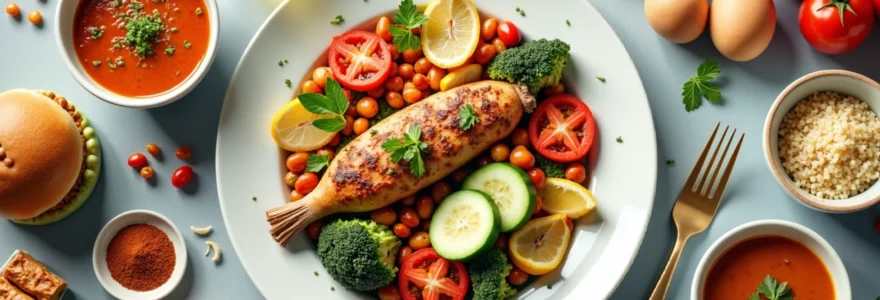The world of plant-based cuisine is undergoing a remarkable transformation, with vegan and vegetarian gastronomy taking centre stage in culinary scenes across the globe. From traditional dishes rooted in ancient cultures to innovative fine dining experiences, the diversity and sophistication of meat-free cooking are captivating food enthusiasts and challenging preconceptions about plant-based fare. This gastronomic revolution is not just a fleeting trend but a reflection of changing attitudes towards health, sustainability, and ethical consumption.
Plant-based culinary traditions: from mediterranean to asian cuisine
The rich tapestry of plant-based culinary traditions spans continents and cultures, offering a wealth of flavours, textures, and nutritional benefits. These time-honoured cuisines have perfected the art of creating satisfying and delectable meals without relying on animal products, showcasing the versatility of plant-based ingredients.
Greek mezze and middle eastern mezze: A vegan feast
The Mediterranean and Middle Eastern regions boast a vibrant array of vegan-friendly mezze dishes that embody the essence of convivial dining. These small plates are designed for sharing and often feature an abundance of vegetables, legumes, and grains. Popular vegan mezze options include hummus , baba ganoush , dolmades (stuffed vine leaves), and tabbouleh . The use of olive oil, fresh herbs, and zesty lemon juice creates a symphony of flavours that celebrate the region’s bountiful produce.
The beauty of mezze lies in its ability to transform simple ingredients into a feast for the senses, proving that plant-based dining can be both nutritious and indulgent.
These dishes not only showcase the culinary prowess of Mediterranean and Middle Eastern chefs but also highlight the region’s emphasis on fresh, seasonal ingredients and balanced nutrition. The mezze tradition exemplifies how plant-based eating can be a communal, joyful experience that brings people together over shared plates and flavours.
Indian vegetarian thali: regional diversity on a platter
India’s vegetarian cuisine is renowned for its complexity and regional diversity, perfectly encapsulated in the concept of the thali. A thali is a complete meal served on a large platter, featuring a variety of dishes that represent a balance of flavours, textures, and nutrients. Each region of India boasts its own unique thali composition, reflecting local ingredients and culinary traditions.
A typical vegetarian thali might include:
- Dal (lentil curry)
- Sabzi (vegetable dishes)
- Rice or roti (flatbread)
- Raita (yoghurt-based side dish)
- Pickles and chutneys
The diversity of Indian vegetarian cuisine is staggering, with each state offering its own specialities. For instance, Gujarat is famous for its dhokla (steamed fermented rice cake), while Tamil Nadu is known for its sambar (lentil and vegetable stew). This rich tapestry of flavours and cooking techniques demonstrates the incredible potential of plant-based ingredients when combined with centuries of culinary expertise.
Japanese shojin ryori: the art of zen buddhist cuisine
Shojin Ryori, the traditional dining style of Zen Buddhist monks in Japan, represents one of the most refined and contemplative approaches to vegan cuisine. This ancient culinary practice emphasises simplicity, seasonality, and mindfulness in both preparation and consumption. Shojin Ryori meals typically consist of carefully balanced dishes that adhere to the principle of ichiju-sansai (one soup, three sides).
Key elements of Shojin Ryori include:
- Goma-dofu (sesame tofu)
- Tempura vegetables
- Pickled vegetables (tsukemono)
- Seasonal vegetable soups
The philosophy behind Shojin Ryori extends beyond mere sustenance, viewing food preparation as a form of meditation and a way to cultivate gratitude for nature’s bounty. This approach to plant-based cooking has influenced contemporary Japanese cuisine and continues to inspire chefs worldwide with its focus on purity of flavour and aesthetic presentation.
Global vegan fine dining: Michelin-Starred Plant-Based restaurants
The realm of high-end gastronomy is experiencing a plant-based revolution, with Michelin-starred chefs embracing the challenge of creating exquisite vegan dishes that rival their animal-based counterparts. This shift is not only elevating the status of plant-based cuisine but also pushing the boundaries of culinary creativity.
Eleven madison park’s vegan transformation in new york city
In a bold move that sent shockwaves through the culinary world, New York’s three-Michelin-starred Eleven Madison Park announced its transition to an entirely plant-based menu in 2021. Under the guidance of chef Daniel Humm, the restaurant has reimagined fine dining through a vegan lens, proving that luxury and sustainability can coexist on the plate.
Eleven Madison Park’s vegan tasting menu showcases innovative techniques and unexpected flavour combinations, such as:
- Tonburi (Japanese “caviar”) with pea cream
- Grilled king oyster mushroom with fermented almond cream
- Dehydrated beet with horseradish and herbs
This transformation has not only challenged the notion of what constitutes fine dining but has also set a new standard for sustainable luxury in the restaurant industry. The success of Eleven Madison Park’s plant-based menu demonstrates that vegan cuisine can achieve the highest levels of gastronomic excellence.
ONA by claire vallée: france’s first vegan michelin star
In a country renowned for its butter-rich, meat-centric cuisine, ONA (Origine Non Animale) by Claire Vallée made history in 2021 as the first vegan restaurant in France to be awarded a Michelin star. Located in the southwestern town of Arès, ONA showcases the potential of plant-based ingredients in French haute cuisine.
ONA’s success proves that plant-based cuisine can achieve the highest culinary accolades, even in the heartland of traditional French gastronomy.
Chef Vallée’s innovative approach combines classic French techniques with global flavours and locally-sourced, organic ingredients. Her tasting menu features dishes such as pine, boletus and sake-accompanied rice, and a intriguing dessert of voatsiperifery pepper, tonka and gariguette strawberry. ONA’s recognition by Michelin is a testament to the evolving landscape of fine dining and the growing acceptance of plant-based cuisine at the highest levels of gastronomy.
Joia by pietro leemann: milan’s vegetarian gastronomic pioneer
Joia, helmed by Swiss-born chef Pietro Leemann, has been at the forefront of vegetarian fine dining in Italy since 1989. In 1996, it became the first vegetarian restaurant in Europe to receive a Michelin star, a distinction it has maintained ever since. Leemann’s cuisine blends Western and Eastern philosophies, creating dishes that are both visually stunning and deeply nourishing.
Joia’s menu is a celebration of organic, locally-sourced ingredients, with dishes that tell a story and engage all the senses. Examples include:
- “Un Gioco di Ombre” (A Play of Shadows): A composition of seasonal vegetables
- “L’Evoluzione della Tradizione” (The Evolution of Tradition): A reinterpretation of classic Italian flavours
- “Il Piatto della Meditazione” (The Meditation Plate): A dish designed to be eaten mindfully
Leemann’s approach to vegetarian cuisine goes beyond mere gastronomy, incorporating elements of philosophy, art, and spirituality into each plate. Joia’s enduring success and influence on the Italian culinary scene demonstrate the power of plant-based cooking to elevate and transform traditional cuisines.
Street food vegan: Plant-Based delights from global markets
While fine dining establishments are pushing the boundaries of vegan cuisine, some of the most exciting and accessible plant-based innovations are happening on the streets. Street food vendors around the world are adapting traditional recipes and creating new plant-based offerings that capture the essence of local flavours.
Tel aviv’s vegan shawarma and falafel scene
Tel Aviv has earned a reputation as one of the world’s most vegan-friendly cities, with its street food scene playing a significant role in this accolade. The city’s vendors have perfected plant-based versions of Middle Eastern classics, offering vegan alternatives that rival their meat-based counterparts in flavour and texture.
Vegan shawarma, traditionally made with spit-roasted meat, is reimagined using seitan or jackfruit, seasoned with a blend of Middle Eastern spices and served in pita bread with an array of fresh salads and tahini sauce. Falafel, already a vegan staple, is elevated to new heights with innovative flavour combinations and presentation styles.
The popularity of these plant-based street food options in Tel Aviv reflects a broader shift towards more sustainable and ethical eating habits, while still honouring the rich culinary traditions of the region.
Mexico city’s vegan tacos al pastor and tamales
Mexico City’s vibrant street food culture is embracing plant-based alternatives, with vendors offering vegan versions of beloved classics like tacos al pastor and tamales. These innovative adaptations maintain the bold flavours and satisfying textures of traditional Mexican street food while catering to a growing demand for meat-free options.
Vegan tacos al pastor often feature marinated soy protein or jackfruit in place of pork, grilled on a vertical spit and served with pineapple, onions, and cilantro. Vegan tamales might be filled with vegetables, beans, or plant-based cheese, wrapped in corn husks or banana leaves, and steamed to perfection.
The success of vegan street food in Mexico City demonstrates that plant-based alternatives can be just as satisfying and flavourful as their meat-based inspirations.
These plant-based street food innovations not only cater to vegans and vegetarians but also appeal to omnivores looking to reduce their meat consumption without sacrificing flavour or cultural connection.
Bangkok’s jay food stalls: thai buddhist vegetarian cuisine
In Bangkok, jay food stalls offer a unique glimpse into Thai Buddhist vegetarian cuisine. Jay food adheres to strict vegetarian principles, avoiding not only meat and animal products but also strong-smelling vegetables like garlic and onions. These restrictions have led to incredibly creative and flavourful plant-based dishes that showcase the diversity of Thai ingredients and cooking techniques.
Popular jay street food options include:
- Khanom jeen (fermented rice noodles with curry)
- Pad thai jay (stir-fried rice noodles with tofu and vegetables)
- Khao mok jay (vegetarian biryani)
- Khanom buang jay (crispy pancakes with sweet or savoury fillings)
The prevalence of jay food stalls in Bangkok, particularly during the annual Vegetarian Festival, highlights the important role that plant-based cuisine plays in Thai culture and spirituality. These stalls offer both locals and tourists the opportunity to explore the rich flavours of Thai vegetarian cooking in an accessible and affordable format.
Innovative Plant-Based ingredients revolutionising global gastronomy
The surge in plant-based eating has sparked a wave of innovation in ingredient development, with chefs and food scientists exploring new ways to create textures, flavours, and nutritional profiles that rival or surpass animal-based products. These innovative ingredients are not only expanding the possibilities for vegan and vegetarian cuisine but also challenging our perceptions of what plant-based food can be.
Aquafaba: the versatile chickpea brine in modern vegan baking
Aquafaba, the viscous liquid left over from cooking chickpeas, has emerged as a game-changing ingredient in vegan baking and cooking. Discovered by accident and popularised through social media, aquafaba has properties that closely mimic those of egg whites, making it an excellent binder and emulsifier.
Some applications of aquafaba in vegan cuisine include:
- Meringues and pavlovas
- Mayonnaise and aioli
- Mousses and marshmallows
- Egg replacer in baked goods
The versatility of aquafaba has revolutionised vegan baking, allowing for the creation of light, airy textures that were previously difficult to achieve without eggs. Its widespread adoption by both home cooks and professional chefs demonstrates the power of innovative thinking in advancing plant-based cuisine.
Jackfruit: from southeast asian markets to global meat substitute
Jackfruit, a large tropical fruit native to Southeast Asia, has gained international recognition as a versatile meat substitute. When young and unripe, jackfruit has a neutral flavour and a fibrous texture that closely resembles pulled pork or shredded chicken when cooked.
Innovative uses of jackfruit in global cuisine include:
- BBQ pulled “pork” sandwiches
- Vegan “crab” cakes
- Jackfruit curries and stir-fries
- Taco and burrito fillings
The rise of jackfruit as a meat alternative highlights the potential for traditional ingredients from one culinary tradition to find new applications in diverse global contexts. Its popularity has also led to increased cultivation and export opportunities for jackfruit-producing countries, creating economic benefits alongside culinary innovation.
Seitan: the ancient wheat gluten protein in contemporary cuisine
Seitan, a protein-rich food made from wheat gluten, has been used in Chinese and Japanese cuisine for centuries but has recently gained popularity as a versatile meat substitute in Western plant-based cooking. Its chewy texture and ability to absorb flavours make it an excellent base for creating plant-based versions of traditional meat dishes.
Modern applications of seitan include:
- Vegan “steaks” and roasts
- Plant-based deli slices
- Seitan-based sausages and burgers
- Stir-fry and kebab alternatives
The resurgence of seitan in contemporary plant-based cuisine demonstrates how ancient food traditions can be adapted and reinvented to meet modern dietary preferences and sustainability goals. Its high protein content and versatility make it a valuable ingredient for chefs looking to create satisfying plant-based alternatives to meat-centric dishes.
Vegan and vegetarian food festivals: celebrating Plant-Based culture
The growing popularity of plant-based diets has given rise to a vibrant festival culture that celebrates vegan and vegetarian cuisine. These events not only showcase the latest innovations in plant-based food but also serve as gathering points for like-minded individuals to share ideas, recipes, and advocacy efforts.
Vegfest UK: britain’s largest vegan event series
VegFest UK has grown to become one of the most significant vegan events in Europe, with annual festivals held in London, Bristol, and Brighton. These events attract thousands of
visitors, showcasing the latest in vegan food, lifestyle products, and ethical fashion. The festivals feature:
- Cooking demonstrations by renowned vegan chefs
- Talks and workshops on plant-based nutrition and sustainability
- Live music and entertainment
- A diverse range of vegan food vendors and product exhibitors
VegFest UK events play a crucial role in mainstreaming veganism in Britain, offering a platform for both established brands and innovative startups to reach a wider audience. The festivals’ success reflects the growing interest in plant-based lifestyles and the demand for more diverse vegan options in the market.
Veggie world: europe’s Plant-Based trade fair circuit
Veggie World is Europe’s largest and most international vegan trade fair, with events held in multiple countries including Germany, France, Spain, and the Netherlands. These B2B and B2C events bring together plant-based businesses, consumers, and industry professionals to showcase the latest innovations in vegan products and services.
Key features of Veggie World events include:
- Product launches and tastings from leading vegan brands
- Networking opportunities for industry professionals
- Educational seminars on plant-based nutrition and sustainable business practices
- Cooking shows featuring innovative vegan recipes
Veggie World’s pan-European presence has contributed significantly to the growth and professionalization of the plant-based sector, facilitating connections between producers, retailers, and consumers across borders. The events serve as a barometer for emerging trends in the vegan market and play a crucial role in driving innovation in plant-based products.
Toronto vegetarian food festival: north america’s Longest-Running veg event
The Toronto Vegetarian Food Festival, established in 1985, holds the distinction of being North America’s longest-running event dedicated to vegetarian cuisine. Held annually at the Harbourfront Centre, this free festival attracts over 40,000 visitors and has played a pivotal role in promoting plant-based eating in Canada and beyond.
The Toronto Vegetarian Food Festival’s longevity and continued growth reflect the enduring appeal and relevance of plant-based lifestyles in North American culture.
The festival’s diverse programming includes:
- Culinary demonstrations by celebrity vegan chefs
- Speaker series featuring thought leaders in plant-based nutrition and animal rights
- An extensive marketplace showcasing local and international vegan products
- Interactive workshops on topics ranging from vegan cheese-making to sustainable gardening
What sets the Toronto Vegetarian Food Festival apart is its commitment to education and community-building. The event not only celebrates plant-based cuisine but also serves as a platform for discussing broader issues related to animal welfare, environmental sustainability, and public health. Its success has inspired similar events across North America, contributing to the wider acceptance and accessibility of vegetarian and vegan lifestyles.
These vegan and vegetarian food festivals play a crucial role in the global plant-based movement, serving as catalysts for innovation, education, and community-building. By bringing together diverse stakeholders – from curious omnivores to committed vegans, from artisanal producers to multinational corporations – these events are shaping the future of food and helping to create a more sustainable and compassionate world.


